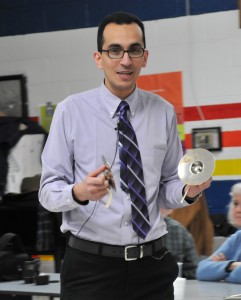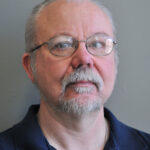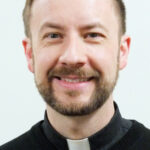By Lindsay Steele
The Catholic Messenger
BURLINGTON — The beheading of 21 Egyptian Coptic Christians by Islamic State militants in mid-February may have seemed a world away for some, but in Burlington, the murders hit particularly close to home.

Deacon George Bishara, a Coptic Orthodox Christian, plays cymbals and sings a Coptic hymn at Catholic Adult Fellowship Evening in Burlington March 4.
Egyptian Coptic Christians live and work in the Burlington area and use the chapel at St. John Catholic Church in Burlington for their worship services.
“There are martyrs every day in Egypt,” said Deacon George Bishara, an Egyptian-born Coptic Christian living in the Burlington area. “I am so proud of these 21 men, and everyone in Egypt that doesn’t leave their faith.”
Deacon Bishara gave a presentation on Coptic Christianity at Catholic Adult Fellowship Evening (CAFÉ) March 4 in the Notre Dame School cafeteria. The presentation had been scheduled prior to the executions, but the recent events brought an added level of interest in the faith. The cafeteria was standing room only by the time Deacon Bishara stood up to speak. Members of the local media were on hand to cover the presentation.
“I was very upset when I saw those poor guys lined up (to be beheaded by Islamic State militants). I didn’t know who Coptic Christians were,” said Elaine Cortelyar, a member of Ss. John & Paul Parish in Burlington. As a regular guest at the weekly CAFÉ series, she said she hadn’t seen such a large turnout in quite some time. Her parish co-sponsors the CAFÉ series with Ss. Mary & Patrick Parish in West Burlington and St. Mary Parish in Dodgeville.
Deacon Bishara explained that Coptic Christians living in the Burlington area work for the new Iowa Fertilizer Company (IFCo) plant in nearby Wever; IFCo is a subsidiary of Egyptian-based Orascom Construction Industries.
When the Egyptian group arrived about 18 months ago, its members needed a place to worship. They approached Father Marty Goetz, pastor of Ss. John & Paul Parish, asking if they could use the chapel space. Fr. Goetz received the blessing of Bishop Martin Amos to do so. The Ecumenical Directory allows parishes to lend their worship space to other religious groups that have nowhere else to worship, provided the parish has the bishop’s approval.
Fr. Goetz told The Catholic Messenger, “They needed a place to worship. I saw it as an opportunity to open our doors to them, to do what Jesus would do. This is an opportunity for them to come closer to Jesus.”
The term Coptic once referred to all Egyptians, but now refers specifically to Egyptian Christians, Deacon Bishara said. He explained that Coptic Christians have been persecuted since the beginning of Christianity. St. Mark the Apostle, who spread Christianity to Africa and is considered by Coptic Christians to be the founder of their church, is believed to have been martyred.
In 284 A.D., 800,000 Coptic Christians were killed during the reign of Roman emperor Diocletian.
In modern-day Egypt, Coptic Christians are in the minority; about 12 to 15 percent of the population identify as Christian, Deacon Bishara said. About 95 percent of Coptic Christians are Orthodox, like those in Burlington, and the rest are Catholic. About 74 percent of Egyptians are Muslim.
Deacon Bishara said most Muslims in Egypt are respectful of religious differences, but a few are extreme and “believe Coptic Christians don’t deserve to live.”
He urged everyone in the audience to pray for the extremist Muslims who are persecuting Christians. “Jesus said we should love them. In our church, we pray that God will enlighten them.”
About Coptic Christianity
Along with Catholics, Coptic Orthodox Christians believe that Christ is both fully human and fully divine, yet one person; however, misunderstandings over language and perhaps political events at the Council of Chalcedon (451 AD) led to a split between Coptic Christians and the rest of Christianity.
Liturgy is prayed in the Coptic language. Music during worship services is chant-like in nature and can be accompanied by small cymbals and triangles.
Coptic Christians celebrate seven sacraments, as Catholics do.











